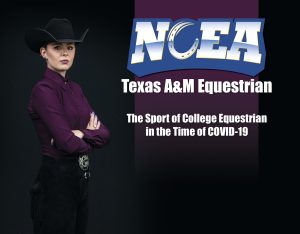Texas A&M Equestrian – The Sport of College Equestrian in the Time of COVID-19
Click here to read the complete article
There are multiple collegiate athletic conferences competing underneath the umbrella of the National Collegiate Equestrian Association (NCEA). While many conferences have elected to suspend competition until a later date, the SEC has chosen to move forward with its athletic season. I’m unable to speak to the experiences and feelings of girls who may not be able to look forward to a season in the coming year; but, for Texas A&M, Auburn, Georgia, and South Carolina, it’s business as usual, for the most part.
While there are still a lot of unknowns–like Nationals, SECs, and the spring season–we now know that we will be allowed the opportunity to compete in a few meets in the time frame of the next few months. It has been announced that spring courses will continue in the same online format as the fall, so there are no guarantees about our opportunity to compete or even practice in the coming semester.
We have spoken with a current senior, a 2020 graduate, and an incoming freshman at Texas A&M to provide insight on what competing, living, and attending college in the midst of a global pandemic looks like. However, we all recognize that the losses we have experienced are dismal in comparison to the loss of life as a result of COVID-19. However, it’s important that those planning to compete at some of the larger shows, like the AQHA World Championship, understand both the past and present impact COVID-19 will have on the world of collegiate equestrian in order to minimize the risk to the horse industry at large.
Fellow Senior Horsemanship rider Hannah Tapling sums it up in the best way saying, “COVID was something none of us expected in the first place, and we were further shocked when, after many people assured us that it was temporary, it was not over soon. I vividly remember my first COVID meltdown. I had received a call from my summer internship program informing me that it had been cancelled. Then, I had to come to the realization that things like report dates, fall meet schedules, and summer free-rides were no longer a given. In short, this was the moment it became very clear that COVID would not be over soon.” Tapling speaks of a similar experience when she realized that she might not be able to see her teammates face-to-face in the fall. But, after recently being informed that we would be able to practice with our teammates, and best friends, as well as possibly participate in meets later in the year, Tapling was speechless. “It was so far beyond what any of us were expecting that the frustrations of the past season were washed away, and we were genuinely overjoyed,” she says. Things may look a little different, but Tapling expresses her gratitude for the ability to finish her collegiate riding career with some of the same horses, friends, and opportunities that have made her time at Texas A&M so valuable.











